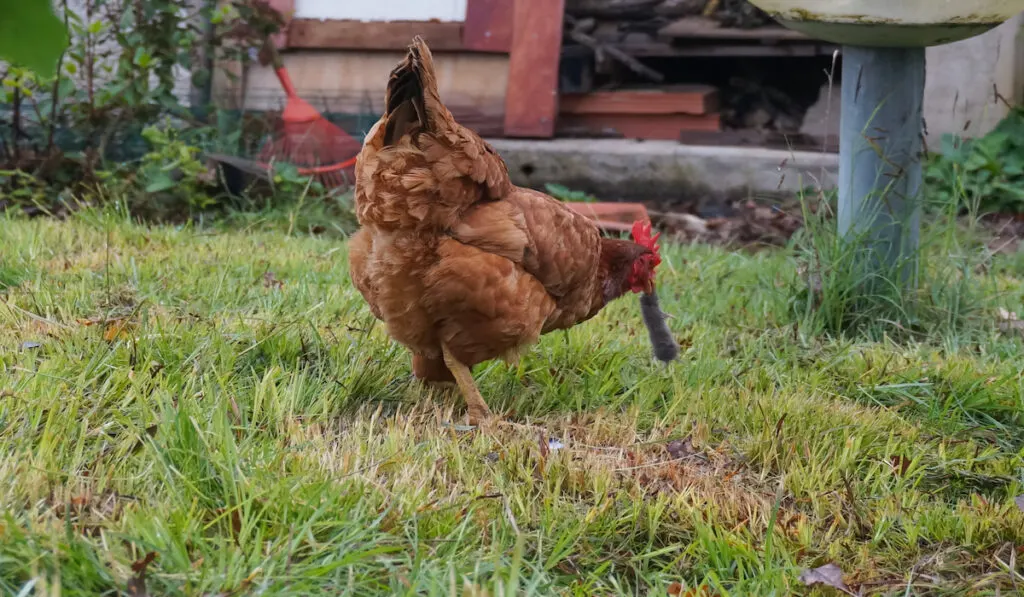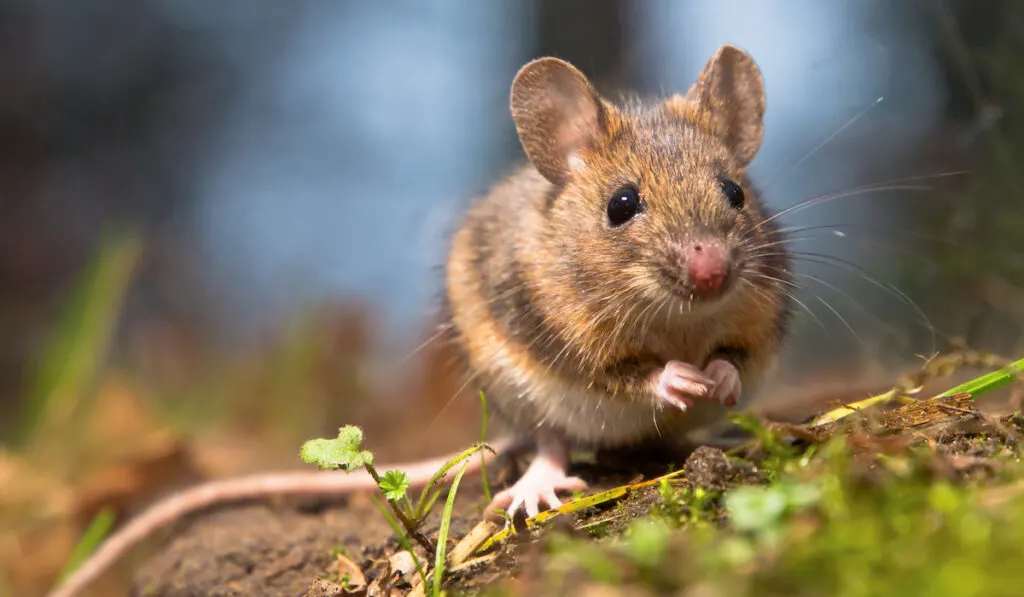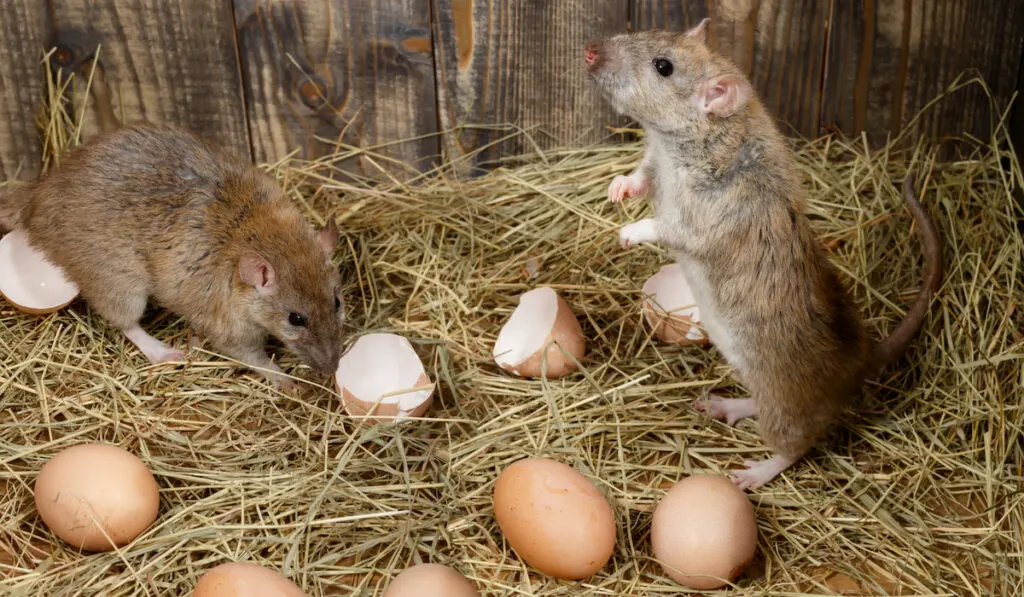When it comes to the diet of a chicken, many things are fair game – whether plant matter or animal matter. But considering their size, chickens are typically restricted to preying on smaller animals like insects, small reptiles, small amphibians, and domestic rodents.
Do chickens eat mice?
Chickens eat mice when they can. But there are some potential health risks to chickens when they consume mice. For this reason, it is sometimes better if they avoid eating these little rodents in the first place.

You must be wondering how mice pose health risks to chickens. Well, we narrate all the details and much more in the rest of this article. So, read to the end!
Table of Contents
Do Chickens Eat Mice?
Chickens do eat mice. This fact might come as a surprise to some people. However, since chickens are omnivorous, it is perfectly normal for them to eat mice.
Like us humans, all chickens may not have a taste for the same types of prey. So, while chickens can eat mice, members of your flock may opt not to.
If you are lucky and your chickens hunt mice, then you may just have natural pest controllers on your hands. Besides mice, chickens can hunt various other vermin. Some of them include lizards, small snakes, scorpions, worms, bugs, and rats.
While chickens are great at keeping pests away, they may be of little or no help when asleep. Chickens have been noted to sleep the night away during mice infestations. So, you should not leave them to handle the entirety of your pest control efforts.
Interestingly, the times when chickens are asleep offers mice a window to attack them. So, it is not uncommon for mice to chew the feathers and feet of sleeping chickens. However, if the chickens should wake up at such time, there may be trouble for the mice.
Are Mice Healthy for Chickens?
Mice are healthy for chickens only when they are free of poison, diseases, or parasites. If a chicken eats a mouse that has fallen for a rodenticide bait, the chicken may be indirectly affected. This is called secondary toxicosis.
In the same vein, mice infected with a disease or infested with a parasite are potentially harmful to chickens. One such disease chickens may get from an infected mouse is leptospirosis.
If your chickens enjoy eating mice, you may not be able to stop them totally. But you should try reducing the influx of mice into their coop and surroundings.
If you notice that one or some of your chickens have eaten a mouse, quarantine them to be on the safer side. This way, if they get sick, the other members of the flock will not be infected. You may also try treating them for common chicken parasites regularly.

Benefits of Mice for Chickens
The primary benefit chickens get from eating mice is protein. A mouse treat is highly proteinous, and chickens, especially egg-laying hens, can benefit from occasionally eating one. In fact, layers might produce even bigger eggs if they get enough protein from eating mice.
Besides protein, mice may also offer calcium to chickens. The bones of mice are high in calcium, so as chickens consume them, they get some calcium.
Dangers of Mice to Chickens
- As we mentioned earlier, when chickens are asleep, mice sometimes attack them by pulling their feathers off or chewing their feet. Of course, if this act persists, your chickens’ health may be affected.
- That aside, mice that are sick or disease-carriers can transmit infections to chickens. We already talked about possible disease transmission when a chicken eats mice, but the possibility exceeds that. When mice get inside a chicken coop, they may litter the space with their droppings. In many cases, these droppings can also infect chickens.
- Mice may also carry ectoparasites like fleas, ticks, and mites. Therefore, if they come in contact with your chickens, they may transmit these parasites. Obviously, these ectoparasites will affect your chickens’ health negatively.
- Mice may also promote infection amongst your chickens. If they encounter parasites in your chickens’ droppings, they may spread the parasites to non-infected birds.
- Mice will eat chicken eggs.
How to Keep Mice Away From Your Chickens
If you have read this far, you know a mice infestation can not be good for your chickens. To avoid such, follow the tips below:
- Block every possible hole through which the mice can enter the coop.
- Clean the chicken coop regularly. Mice are typically drawn to filthy spaces. So, if your chicken coop is clean, they will not come in.
- While cleaning, ensure you remove leftover feed; mice are unlikely to enter if there is nothing for them to eat.
- Spray repellents like cloves, cayenne pepper, and peppermint oil in the chicken house. The smell will drive them away.

What to Do When Mice Infest Your Chicken Coop
- The first thing to do is get rid of the mice. You may get professional pest control to remove them for you, or you may go DIY.
- When the mice are out, clean the coop thoroughly. Start by disinfecting the coop floor and every other item the mice may have touched.
- Once you have done this, remove soiled bedding and droppings. If possible, you may burn the bedding and droppings.
- While cleaning, get out any contaminated feed you come across.
- Then when you are done cleaning, rinse the coop out thoroughly with water.
Can I Eat Eggs From a Chicken That Ate a Mouse?
You can eat eggs from a chicken that ate a mouse, as long as the chicken is healthy. But on the flip side, if your chicken gets sick after eating a mouse, it is better to avoid eating the eggs from such a chicken.
Final Thoughts
Occasional mice treats are generally not an issue for chickens; they are omnivores, so their bodies are designed to digest plant and animal matter. However, regular consumption of mice might affect the balance of your chickens’ diet. It also leaves them more open to consuming poisoned, infected, or sick mice.
Resources
- https://peteducate.com/do-chickens-eat-mice/
- https://www.backyardchickens.com/threads/omg-my-chickens-ate-mice-help.913664/
- https://ucanr.edu/blogs/blogcore/postdetail.cfm?postnum=24075
- https://acglo.com/leptospirosis-is-your-dog-at-risk/
- https://kingcounty.gov/depts/health/communicable-diseases/zoonotic/facts-resources/diseases-by-animal/pocket-pets.aspx
- https://backyardhomesteadhq.com/do-chickens-catch-and-eat-mice-in-coops-fields-etc/
- https://thehensloft.com/do-chickens-eat-mice/
- https://www.seventhgeneration.com/blog/natural-mouse-repellents-work
